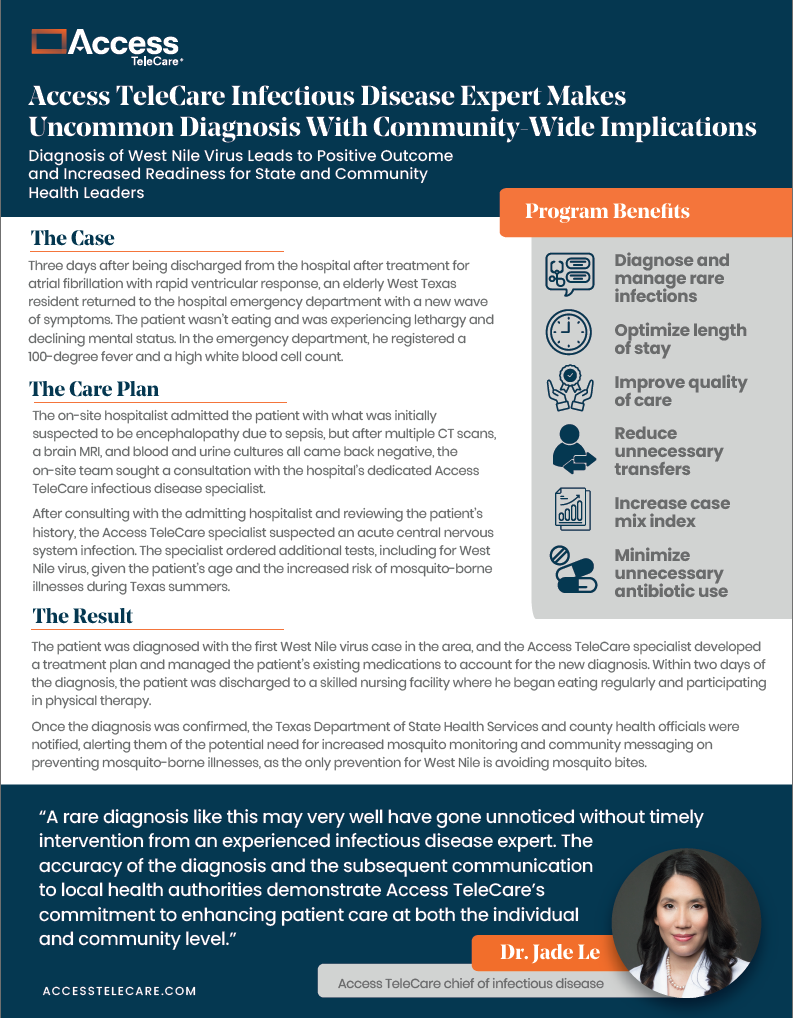Access TeleCare Infectious Disease Expert Makes Uncommon Diagnosis With Community-Wide Implications
Access TeleCare Patient Case Study
The Case
Several weeks after being discharged from the hospital after treatment for atrial fibrillation with rapid ventricular response, an elderly West Texas resident returned to the hospital emergency department with a new wave of symptoms. The patient wasn’t eating and was experiencing lethargy and declining mental status. In the emergency department, he registered a 100-degree fever and a high white blood cell count.
The Care Plan
The on-site hospitalist admitted the patient with what was initially suspected to be encephalopathy due to sepsis, but after multiple CT scans, a brain MRI, and blood and urine cultures all came back negative, the on-site team sought a consultation with the hospital’s dedicated Access TeleCare infectious disease specialist.
After consulting with the admitting hospitalist and reviewing the patient’s history, the Access TeleCare specialist suspected an acute central nervous system infection. The specialist ordered additional tests, including for West Nile virus, given the patient’s age and the increased risk of mosquito-borne illnesses during Texas summers.
“A rare diagnosis like this may very well have gone unnoticed without timely intervention from an experienced infectious disease expert. The accuracy of the diagnosis and the subsequent communication to local health authorities demonstrate Access TeleCare’s commitment to enhancing patient care at both the individual and community level.”
– Jade Le, M.D. | Access TeleCare chief of infectious disease
The Result
The patient was diagnosed with the first West Nile virus case in the area, and the Access TeleCare specialist developed a treatment plan and managed the patient’s existing medications to account for the new diagnosis. Within two days the patient was discharged to a skilled nursing facility, where he began eating regularly
and participating in physical therapy.
Once the diagnosis was confirmed, the Texas Department of State Health Services and county health officials were notified, alerting them of the potential need for increased mosquito monitoring and community messaging on preventing mosquito-borne illnesses, as the only prevention for West Nile is avoiding mosquito bites.
Access TeleCare’s teleInfectious Disease Programs:
Diagnose Rare Infections
Diagnose Rare Infections
24/7 access to world-class infectious disease experts trained to diagnose rare and easily missed diseases.
Optimize Length of Stay
Optimize Length of Stay
Timely care means patients get the care they need sooner so they can get back to their lives without the need for an extended hospital stay.Improve Quality of Care
Improve Quality of Care
Access TeleCare provides 24/7 coverage to ensure hospitals are always prepared to catch uncommon diseases and monitor potential outbreaks and respond quickly.
Reduce Unnecessary Transfers
Reduce Unnecessary Transfers
Care for more patients locally with a dedicated team of infectious disease experts to quickly and accurately assess patient care needs.
Increase Case Mix Index
Increase Case Mix Index
Diagnose and treat a wider range of infectious diseases with a dedicated pod of infectious disease experts delivering care.
Minimize Unnecessary Antibiotic Use
Minimize Unnecessary Antibiotic Use
Access TeleCare ‘s infectious disease experts reduce antibiotic use by ensuring patients get the right treatment, even for complex and rare diagnoses.
Read the latest from Access TeleCare
Championing Maternal Health: Leveraging Telemedicine for Better Outcomes
Maternal Health Awareness Day reminds us of the need for [...]






